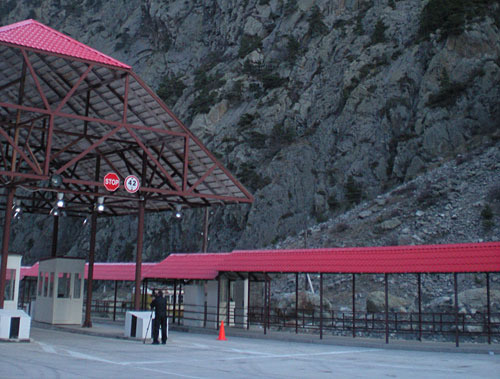
10 March 2010, 22:00
Participants of Moscow-Tbilisi-Yerevan space bridge differ in assessing "Verkhni Lars" opening
In the course of the space bridge held on March 9 by the RIA "Novosti" between Armenian, Georgian and Russian experts, who discussed the opening of the surface border between Russia and Georgia at the check points "Darial" and "Verkhni Lars", it became clear that the experts viewed the event differently. Alexei Malashenko from the Carnegie Institute treated the fact positively, while Georgiy Khaindrava, one of the leaders of the non-parliamentary opposition, found incompatible such factors like "occupation of Georgian regions" and simultaneous restoration of communication between the two countries.
In the opinion of Alexei Malashenko, a member of the Scientific Board of the Moscow-based Carnegie institute, the "Kazbegi-Lars section can be treated as a sort of a window leaf, "through which oxygen can pass." However, Malashenko was rather sceptical as to further progress, having noted that Russian-Georgian relations are aggravated by hostile personal relations of countries' leaders.
Another participant of the space bridge - Sergey Markedonov, a political scientist and head of the division for interethnic relations of the Institute of Political and Military Analysis, - looked somewhat more optimistic. He believes that the opening of the check points is an attempt to establish certain humanitarian relations "atop of irresolvable political problems."
The Georgian experts, unlike their Russian counterparts, were categorically negative in assessing the opening of the border. Georgiy Khaindrava, one of the leaders of the non-parliamentary opposition and former state minister on conflict settlement, has noted the points, which worry Georgia.
Among them: impossibility for ordinary residents of Georgia to get a visa for crossing the border because of the complexity of the procedure; closing of the Russian market for Georgian goods, and, hence, no sense for Georgia to have the traffic resumed; absence of publicity and transparency in the border-opening negotiation process, which raised mistrust in the authorities among the Georgian public.
In Mr Khaindrava's opinion, the only sense of opening the road was in moving supplies to the Russian military base in Gyumri.
His special concern was caused by the fact that the Georgian customs will not examine the transit cargoes.
In reply to it Mr Markedonov reminded that the Russian military base had received its supplies also when the check point "Verkhni Lars" was closed, and the new road, according to his story, has no great strategic value.
Nika Laliashvili, a member of the faction of the Christians-Democratic Movement in the Georgian parliament, stated that the reopening of the check point creates a constant headache of Georgia and a pretext for provocations; this road is a threat to national security of Georgia.
Zaal Casrelishvili, Chairman of the Confederation of Caucasian Nations, said that because of difficulties with obtaining Russian visas by Georgians, they will hardly be able to use the "Verkhni Lars".
Alexander Iskanderyan, an Armenian political scientist and director of the Institute of the Caucasus, said that the opening of the border can hardly be regarded as a window in improving the mutual relations between Russia and Georgia.
"I'd call it reformatting the conflict. That is, the Russian-Georgian political conflict remains as it was, while other components of the conflict - humanitarian and economic ones - are lifted or softened," the expert noted.
As to the actual opening of the "Verkhni Lars" check point, Mr Iskanderyan expressed his doubt that weapons could be transported across the check point, and that the Georgian party couldn't take advantage of the open border.
As to the threat to national security of Georgia, Alexander Iskanderyan noted that this is the issue of political will.
Alexei Markarov, a political scientist from Yerevan, emphasized that since up to one third of Armenian exports goes to Russia the opening of the new road will naturally improve the logistics.
Author: Beslan Kmuzov; Semen Charnyj Source: CK correspondents




